A Chicken is Not Just a Chicken!
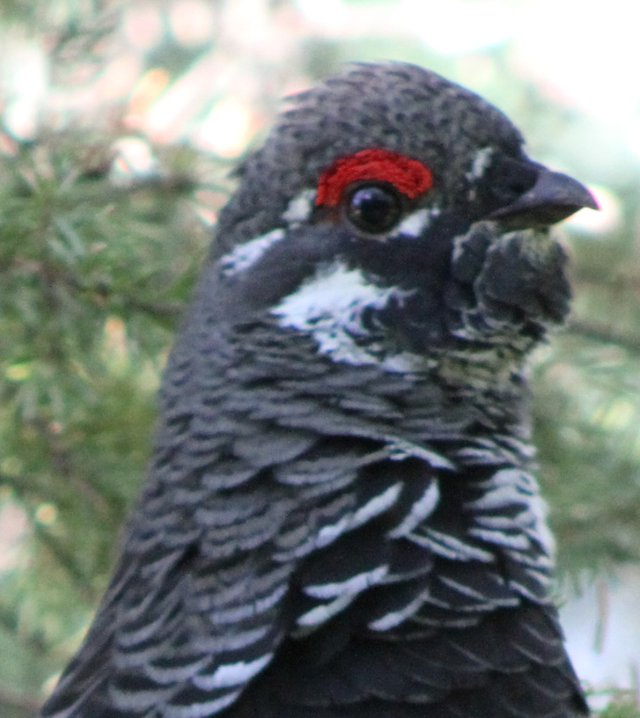
photo © Heather Johnsgaard
Falcipennis canadensis
The day I stumbled upon the Spruce Grouse, also known as the Canada Grouse, I was captivated.... perhaps it is more that I am a fan of red and whenever I see something red, I have to stop and look.
I have lived here for 20+ years, and not once had I seen a male in this species of grouse, especially so up close and personal; I did not have my camera with me, but quickly ran home to retrieve it and to my luck, it was still there!
The colouring of the male, as shown in these photos, is really stunning to see. A pretty charcoal gray with white, black and red!
The colouring of the females is a morph between chestnut and gray. Whether or not I have actually seen a female Spruce Grouse is debatable because to be honest, I have not paid that close attention to the wild chickens roaming our yard, and because the females species of both the Spruce and Ruffed grouse look very similar. I will have to make it a point to pay more mind to them the next time I see them.
The Spruce Grouse
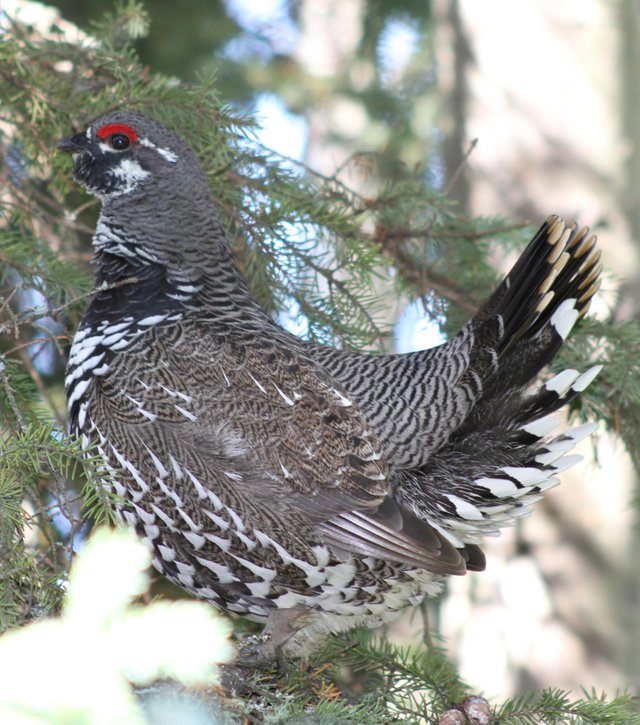
photo © Heather Johnsgaard
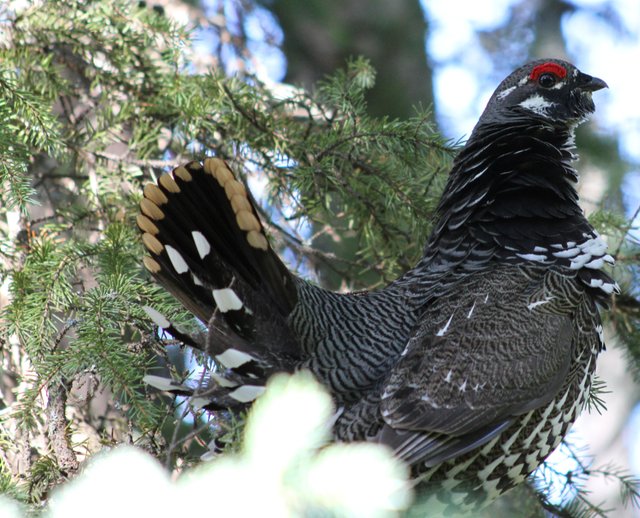
photo © Heather Johnsgaard
Habitat
This bird inhabits a large portion of Canada and United States, preferring conifer forests, pines, and muskeg ridden areas.
Excellent with their camouflage, they are quite elusive as they often sit motionless in the trees while observers pass by within just a few feet, often missing sight of them.
The grouse much prefer to choose to walk on the ground or along tree limbs rather than fly.
Being the most silent of all grouse, they do have a few calls which they use in warning of predators, to ward off intruders, and some brooding calls. The males also have such sounds as wing claps, soft drumming, tail swishes and flight whooshes.
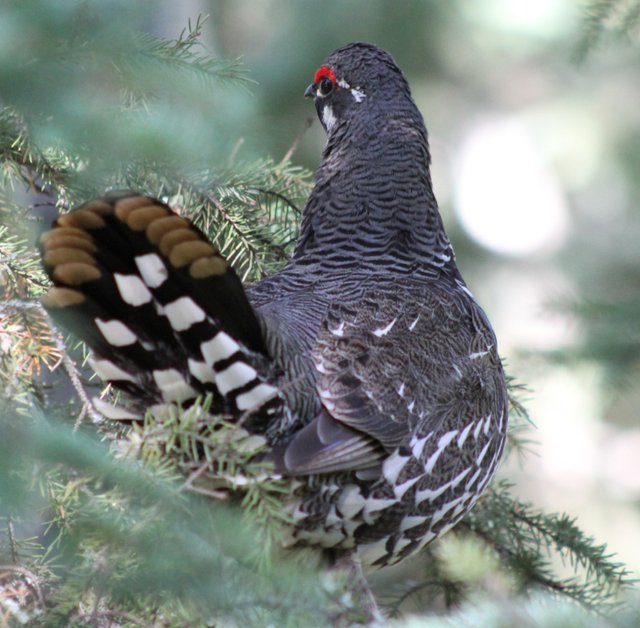
photo © Heather Johnsgaard
Diet
Nesting and Breeding
The nest, made on the ground by the female, is a shallow depression which is lined with feathers, pine needles and leaves, and hidden under dense cover.
The average number of eggs laid is 4-7 eggs per clutch with an incubation period of approximately 20-24 days. The young leave the nest shortly after hatching.
The females breed only once a year starting at age one. Males usually establish a territory at about two years old and are promiscuous.
The Young
While the mother will brood them mostly at night until they are about 3-4 weeks old, the young are able to walk from the nest after about eight hours when they are dry. They find all their own food, consuming a lot of insects, and are able to make short flights at about 6-8 days old. They are fully grown at 10-11 weeks and tend to become fully independent by the time they are about 2.5 to 3 months old.
Fool's Hen
Due to the gentle nature of this bird, it has earned the nickname "fool's hen" because, relying on its camouflage and quiet and motionless nature, it allows predators to approach it very closely before it makes it's escape and flies away.
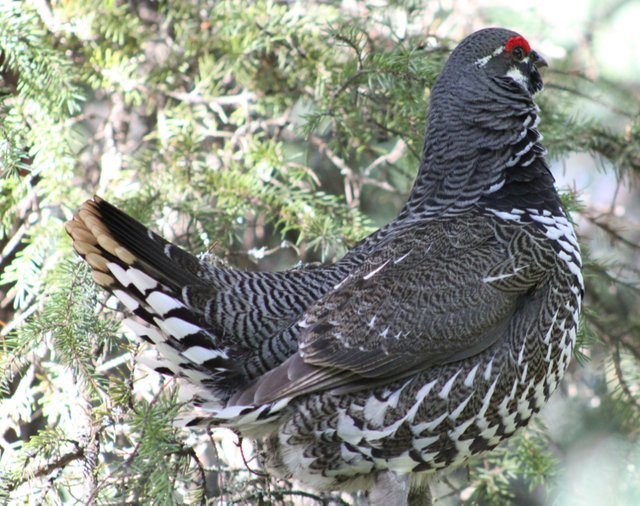
photo © Heather Johnsgaard
What a gorgeous bird! I have been up close to ruffed grouse, but spruce grouse are only seen in a few isolated areas in northern Wisconsin, and I have never been lucky enough to see one.
He is beautiful, isn’t he! It was indeed my lucky day!
Thanks for popping in 😊
Hi @thistle-rock
As a follower of @haccolong this post has been randomly selected and upvoted by @hoaithu's Curation Trail with 20upvotes
This is random free upvote daily when you follow @haccolong
Thank you @hoaithu 😊
What a gorgeous bird - this is another one I have no photos of. Great job on these photos, and thanks for providing a great deal of information about them. I love the photos - well done! Thanks for posting in Feathered Friday. Voted and resteemed :-)
You are welcome, and thank you for the opportunity 😊
Their prints in the snow always make me think a chicken was out walking in the woods.
Yes, and technically they grow "snow shoes" for the winter, lol!
Thanks for stopping by!
Congratulations! Your post was selected by the @dropahead Curation Team (dCT)
The shots are just gorgeous... you managed to capture excellent perspectives that allow us to contemplate the beauty of this bird to its fullest.
Thanks for sharing, best regards.
@dropahead - Supporting your STEEM adventure
Quality review by the dropahead Curation Team
According to our quality standards(1), your publication has reached an score of 89%.
Well said Gabriel García Marquez: "One learns to write by writing" Keep trying, you will soon achieve excellence!
(1) @dropahead's quality standards:
- Graphic relation to the text (Choice of images according to the text)
- Order and coherence
- Style and uniqueness (Personal touch, logic, complexity, what makes it interesting and easy to understand for the reader)
- Images source and their usage license
Thank you kindly @joelsegovia 😊
Howdy thistle-rock! wow what an impressive, unique and handsome bird! Very striking indeed, well done!
Thank you so much @janton!
My pleasure thistle-rock, that was a great post, keep up the good work!
What a handsome fellow! Well-captured!
I love that you've included so much information as well. My first-ever book was actually a bird book that I made in grade school. Everyone else was writing fiction, I was writing about birds, lol. (Mind, this was 2nd grade, I think.)
Love the Scandinavian surname.
Lol, the Scandinavian surname is courtesy of my husband... who would have thought a Scot and a Scandinavian would form a union (in the ancient days 😉)... my maiden name is Stewart... now isn't that just a true Scottish name Heather Stewart, lol.
Thanks for popping in!
I'm sure those unions weren't as uncommon as we would have thought. After all, in a day and age when few bathed, the Vikings kept themselves fairly clean. I'm sure there was little trouble, uh, persuading the odd stray maiden. ;-)
Half of my ancestry is Scandinavian. The other half is (roughly) equally divided between the British Isles and continental Europe (mostly Germany there.)
What a fascinating looking bird. Thank you for introducing him to me. (U&R)
Aren't they lovely!
Thank you for stopping by and for the U&R, very much appreciated! 😊
What a beautiful bird, and your photos are stunning!
We are starting to see wildlife we've not seen in this area in 35 years....
Glad you found these guys. :))
Thank you @goldenoakfarm, I was indeed lucky to see it. So far our wildlife has not changed too much, perhaps our cold temperatures, but it is so nice to see something you have not seen before.
Thanks for stopping in!
Congratulations @thistle-rock! You have completed the following achievement on the Steem blockchain and have been rewarded with new badge(s) :
Click here to view your Board
If you no longer want to receive notifications, reply to this comment with the word
STOP